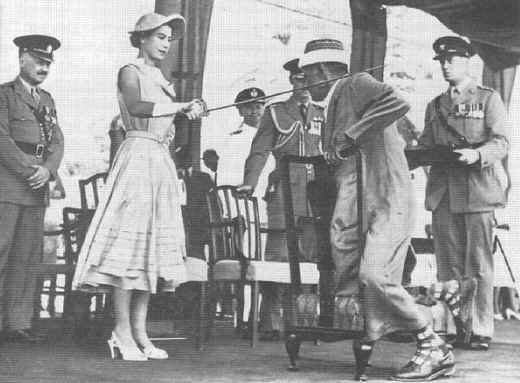Fifty years ago Sayyid Abubakr bin Shaikh Al-Kaff
philanthropist and peacemaker, was knighted for his public
services in Hadhramaut, now a province of the Republic of Yemen.
John Ducker, who served as a political officer in the region
before independence, pays tribute to his memory.
Abubakr bin Shaikh Al-Kaff was a member of a very successful
family of Tarim Sayyids which made a substantial fortune in
trading and real estate in Singapore and the Dutch East Indies.
He was born in Singapore in c1890, but spent the best part of
his life in Wadi Hadhramaut, and the best part of his fortune in
seeking to bring peace to the region. He was largely
instrumental in persuading the British authorities in Aden to
take a more active interest in the welfare of his homeland. In
1934 Harold Ingrains was sent on an exploratory visit; he
returned to the area in 1936 to work with Sayyid Abubakr and the
local Qu’aiti and Kathiri rulers to persuade the warring
tribes to accept a three year truce. Sayyid Abubakr’s personal
influence and liberal purse played a crucial role in
negotiations leading to the general pacification of the country,
which laid the basis for its future security and stability
Before these events, Sayyid Abubakr had already embarked on
the construction of a road from the coast to the interior,
financing much of the cost from his own pocket, including
payments to compensate local tribesmen for the loss of income
earned by their camel caravans before the advent of motorised
transport. He was also involved in the running and improvement
of a hospital and school in Tarim, financed by the Al-Kaff
family charity, which provided free medical care and education
to the local population.
In 1938 Sayyid Abubakr was appointed Companion of the British
Empire (CBE) for his public services. The importance of his
peacemaking role is vividly attested by a petition signed early
that year by some ninety nine Hadhrami notables. This urged him
to postpone his reported intention of travelling abroad for fear
that his absence would put at risk the peace and reforms which
he had helped to initiate.
Sayyid Abubakr was a man of independent spirit who did not
hesitate to speak his mind. When he was advanced to KBE in 1953,
he declined to give up his CBE, as protocol required, remarking
that what the British gave with one hand, they took away with
the other! Both decorations appeared in his letterhead. In 1954
he was formally knighted by HM Queen Elizabeth during her one
and only visit to Aden. During the ceremony Sayyid Abubakr was
exempted from the requirement to kneel before the Sovereign; he
had earlier made it clear that as a Muslim he could only kneel
before God.
Sayyid Abubakr was respected in his personal life as a devout
Muslim and a man of his word; and he was blessed with a wife who
had an equally high reputation. Ingrains wrote of him at some
length in his book, Arabia and the Isles. From the early
1930s until his death in 1965,Western travellers and many
British officials, myself included, benefited from his wisdom,
help and unstinting hospitality.
I was in Seiyun at the time of his death when hundreds of
mourners from all over Hadhramaut gathered to pay their last
respects to him. joined the vast crowd following his coffin for
the ceremonies of burial, with drums beating and women wailing
from the rooftops. It was a hot morning and the dust of the long
funeral procession rose in the still air. We later gathered at
the mudbrick palace of Sayyid Abubakr’s son-in-law, Mashhur
bin Hassan Al-Kaff, to express our condolences to members of the
family
With the exception of Sultan Saleh bin Ghalib Al-Qu’aiti
(d. 1958), there was no comparable figure in the Aden
Protectorate of his generation. Sayyid Abubakr was a great
conciliator and public benefactor whose name will be remembered
with respect long into the future.
 |
| |
| HM Queen Elizabeth knighting
Sayyid Abubakr bin Shaikh al-Kaff during her visit to Aden
in April 1954. |
